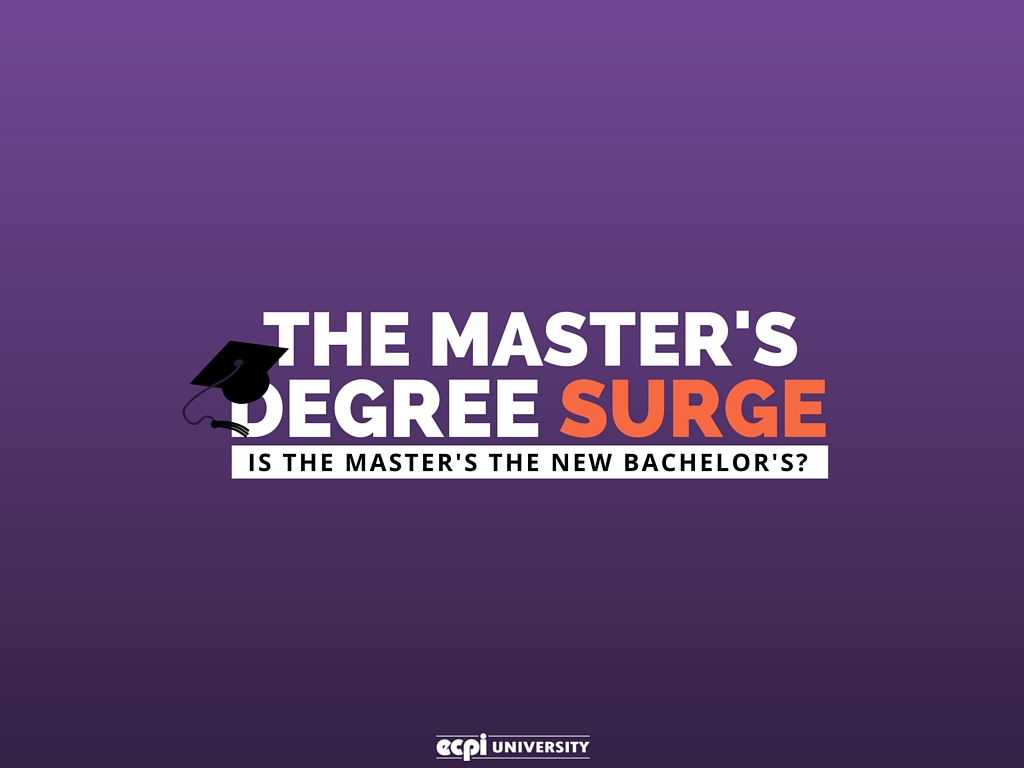
The Master's Degree Surge: Is the Master's the New Bachelor's?
As the job market becomes increasingly competitive and the stock market remains in a constant state of volatility and uncertainty, many people are looking to education to help them stand out.
All of this, however, may be overshadowed by one burning question: Is a master's degree becoming the new bachelor's degree? It is a valid question and a real concern. Let's shine some light on this often asked but rarely answered question.
A Master's Degree is the New Standard
In 1980, the National Center for Education Statistics (NCES) reported that 935,140 bachelor's degrees were conferred by degree-granting institutions in the United States. Nearly 25 years later, the 2012 data (the most recent available) reported nearly 1.8 million bachelor's degrees were conferred: an increase of 47.8%. Contrast that with 302,637 and 754,229 master's degrees conferred in 1980 and 2012, respectively. Master's degree recipients increased 59.9% in the same amount of time. This data tells us not only that both degrees are on the rise, but master's degrees are on a meteoric rise into a new standard.
Bachelor's Degrees are More Common, Curriculum is More Standardized
We are seeing an increasing trend in education where bachelor's degrees have become rather standardized. This isn't necessarily a bad thing, but it costs students the ability to set themselves apart in the workplace with a bachelor's degree. In fact, it could be a benefit seeing as schools are beginning to diversify their curriculum, add programs, and offer better options for financing in order to remain competitive with their peers. Colleges are now in direct competition with one another, and this benefits students but can slightly devalue a bachelor's degree.
Master's Degrees are on the Rise, and Value is King
It's already been mentioned that master's degrees as a whole have been on the rise since 1980. In a time where more and more Americans see the potential in returning to school to overcome economic hardship, we cannot ignore the value of differentiation. Degrees have not necessarily become more specialized, but they have become more recognizable from certain institutions. Obviously, an Ivy League MBA compared side-by-side with an MBA from any other school will trump its competition. With that said, the increase of master's degrees conferred does not necessarily ensure the quality of the degree.
It is important to consider the value of a master's degree from a certain college or university before committing. Is the university simply wanting to increase the number of degrees it has in the workplace, or is it meticulously and painstakingly selecting the best individuals to fit its programs?
Master's Degrees are Trending towards Professional Certifications
A 2011 article from the New York Times attempts to make the argument that master's degrees are the new bachelor's degrees. One of the points author Laura Pappano makes is that degrees, specifically in the social sciences and humanities, are trending towards professional degrees.
"Once allergic to applied degrees," Pappano says, "[humanities departments] are recognizing that not everyone is ivory tower-bound and are drafting credentials for résumé boosting."
This holds true throughout other disciplines. Pappano mention that master's degrees are merging into professional degrees, in part because master's degrees are beginning to blend coursework with real-world scenarios instead of mere theory. This has long been the standard for the master's in business administration (MBA) in which the degree itself is largely governed by the happenings in the real business world, and theory simply cannot be theoretical but must be practical and practicable.
Consider a Master's Degree
We've already seen that master's degrees are on the rise, and if you're looking to make a rise yourself (whether within your existing career area or in something new), consider earning a master's degree.
Of course, there are always things you should think about when evaluating a master's program and comparing programs apples for apples. Here are are a few things to keep in mind:
- Flexibility: Does the program fit your lifestyle?
- Accessibility: Will your coursework, professors, and advisors be accessible at the drop of a hat to work with you or assist you?
- Affordability: Does the program work within your budget or do the financing options work for you?
- Value: Will this degree still be valuable in ten years? What about twenty?
- Accreditation: Is the university accredited by a reputable agency? If not, your degree may be worthless.
Pondering those questions will certainly get you pointed in the right direction. If you have questions, though, head over to ECPI University, find a master’s degree program that's right for you, and talk to an advisor today. The only way you can get where you're going is to get started. It could be the Best Decision You Ever Make!
Big turn around in my life. There's so many people at my university pushing me and motivating me to do so good every...
Posted by Casey Woodson on Monday, February 2, 2015
DISCLAIMER – ECPI University makes no claim, warranty or guarantee as to actual employability or earning potential to current, past or future students or graduates of any educational program we offer. The ECPI University website is published for informational purposes only. Every effort is made to ensure the accuracy of information contained on the ECPI.edu domain; however, no warranty of accuracy is made. No contractual rights, either expressed or implied, are created by its content.
For more information about ECPI University or any of our programs click here: http://www.ecpi.edu/ or http://ow.ly/Ca1ya.


